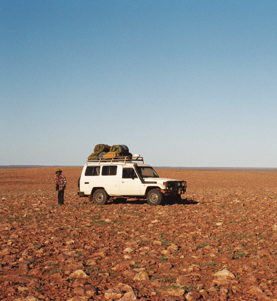Missing report looks for better use of beacons
 Prospectors are being urged to take better safety precautions, after the suspected death of one missing man and a series of costly searches.
Prospectors are being urged to take better safety precautions, after the suspected death of one missing man and a series of costly searches.
The West Australian Department of Mines has launched a safety campaign specifically targeted at prospectors.
The Department says the need for comprehensive safety protocols is increasing, as the number of applicants for the basic permit doubled in the past decade.
The number of people in trouble has risen accordingly, and was highlighted last week with the search for 76-year-old Peter O'Shaughnessy.
Mr O'Shaughnessy was found a day after going missing, but things could have been much worse.
In 2013, 46-year-old Michael Graham disappeared while fossicking for gold, sparking one of WA's biggest searches.
The search covered a 1,500 square kilometre area using aircraft, motorbikes, horses and Aboriginal trackers, but Mr Graham was not found.
The coroner ruled he likely died through misadventure, but his body was never recovered.
The coroner's report into Mr Graham's death prompted the Department of Mines and Petroleum to put out new safety guidelines.
Department spokesperson Tony Bullen says one key message is that locator equipment must be on hand and operational at all times.
“It's a case of what may be days in the wilderness without provisions or injured, being reduced down to hours, and that time is critical to survival,” he told the ABC
“Carrying the device ... does mean that you can be located quickly. It's certainly a device of safety that I wouldn't go anywhere in the wilderness without.”
“These beacons are small devices, about the size of a mobile phone that can be carried on the belt, and they enable someone person in distress to activate a signal that's transmitted by satellite,” he said.
“That signal will be picked up by emergency services, and within a period as short as four hours, emergency crews can be on their way to locate where the signal was coming from.”
But police say most experienced prospectors already carry location devices, and that those most likely to run into trouble were inexperienced people who did not understand the need to carry such a beacon.
There was discussion about making the devices mandatory for anyone in the bush, but the Department said enforcing their use would be prohibitively difficult in remote areas.








 Print
Print